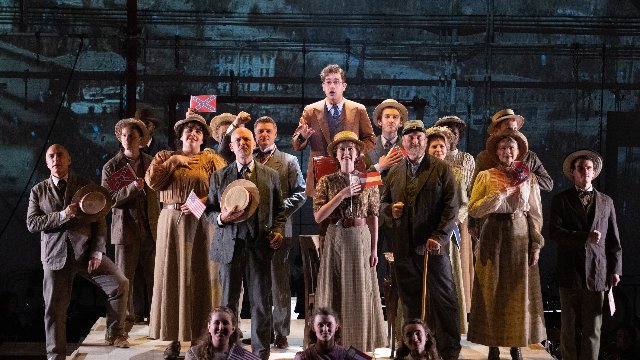Parade a Revival on Broadway
By Albert Uhry Music and Lyrics by Jason Robert Brown
By: Karen Isaacs - Apr 20, 2023
If Parade doesn’t win the Tony Award for the outstanding revival of a musical, the producers should demand a recount.
You can find little fault with this beautifully directed and performed musical. While you may not leave the theater uplifted, you will continue to think about this disturbing but important show in the days and weeks that follow.
Parade, with a book by Albert Uhry (Driving Miss Daisy) and music and lyrics by Jason Robert Brown (The Bridges of Madison County), is based on the true story of Leo Frank. Frank was accused of killing a young girl in 1915 Atlanta. He was the manager of the National Pencil Co and she was an employee. Playing into this case was the facts that Frank was not only Jewish but from New York City. An ambitious prosecutor decided Frank was guilty:the trial was full of perjured witnesses. He was found guilty and sentenced to death. After the Governor commuted the sentence to life in prison, a gang lynched him.
The musical focuses as much on the case as on the relationship between Leo and his wife, Lucille, a native of Atlanta.
As you are watching Parade, your mind may slip to other shows that deal with injustice and the railroading of innocent people, including Kander & Ebb’s brilliant The Scottsboro Boys. Arthur Miller’s The Crucible, about the Salem witch trials, will come to mind as the four young women who work at the factory testify to Frank’s supposed advances using almost the exact same words.
Frank, an outsider had three strikes against him from the beginning: he was Jewish; he was northern when “Yankees” were still not appreciated or welcomed in the south; and thirdly, he was affluent – his father-in-law along the pencil factory. I don’t know whether it’s true what the district attorney said that they had convicted enough African Americans, so they overlooked possible suspects to go after Frank. But it did cause the audience to gasp.
In 1986 the Georgia State Board of Pardons and Paroles pardoned Frank, stating:
Without attempting to address the question of guilt or innocence, and in recognition of the State’s failure to protect the person of Leo M. Frank and thereby preserve his opportunity for continued legal appeal of his conviction, and in recognition of the State’s failure to bring his killers to justice, and as an effort to heal old wounds, the State Board of Pardons and Paroles, in compliance with its Constitutional and statutory authority, hereby grants to Leo M. Frank a Pardon.
The highlights of the show are the performances not only of Ben Platt as Frank and Micaela Diamond as Lucille as well as Sean Allan Krill as Georgia Governor Slayton, Paul Alexander Nolan as the prosecutor Hugh Dorsey, Alex Joseph Grayson as the factory janitor, and Howard McGillin in two roles.
Platt and Diamond bring depth to both characters and the changing relationship between them. Lucille demonstrates courage and determination to help her husband, which surprises him. The song, “This Is Not Over Yet” is truly touching. It is ironic that all this occurs after Frank has expressed his dislike of living in Atlanta in “How Can I Call This Home?”
Jason Robert Brown’s score is terrific. I could list song after song that not only expresses the perfect emotion at just the right moment. From “You Don’t Know This Man” to the intermingling of “The Factory Girls” and “Come Up to My Office” during the trial shows how the prosecutor is portraying Frank.
You can question some of the choices Uhry made in the book. The show begins with a prologue scene between a young man going off to fight for the South in the Civil War and his supposedly elderly self. Though the song “The Old Red Hills of Home” is good, it is not clear why the scene is necessary. The same can be said for the opening number in act two, “A Rumblin’ and a Rollin’” sung by servants of the Governor. It is toe-tapping but irrelevant.
While Frank had a vigorous defense, it apparently could not shake the false testimony of many of the witnesses. In Parade, while there is a defense attorney sitting in the courtroom, he says nothing.
Director Michael Arden uses a central area to serve as a main playing area; it becomes the Frank home, the courtroom and later the prison farm. He also has all the characters sitting as if spectators to the events.
The scenic design by Dane Lafrey and projections by Sven Ortel as well as the lighting by Heather Gilbert, sound by Jon Weston and Costumes by Susan Hilferty all help create 1913 in Atlanta, when it was a much smaller city.
Parade is a musical that deserves to be seen by a wide audience – not only for the performances and the music, but also because, unfortunately, this type of situation and prejudice still occurs, over 100 years later.
Bernard B. Jacobs Theatre; 1,027 seats; $199 top
Posted by Two on the Aisle

